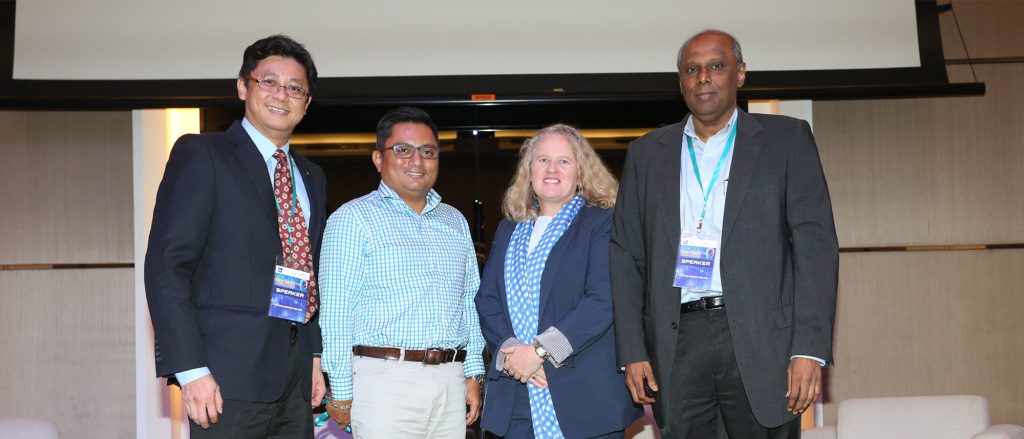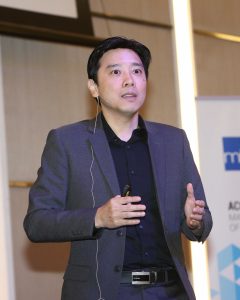
Accountants warned to embrace BDA fast, or risk becoming obsolete.
By Amalina Anuar
Accountants must be fearless in adopting Big Data Analytics (BDA) – or risk becoming fossilised.
“Data is changing the way we live, the way we work, the way we interact and play. No one can assume that traditional bases of competitive advantage will continue to last,” cautioned Fusionex CEO Ivan Teh at Plenary 2 of the inaugural MIA AccTech Conference 2018.
He warned, however, that “data is only valuable when it’s refined. Raw data is a liability and the main challenge here is to change these liabilities into assets. This is the key thing that will differentiate our organisations from the rest of the world.”

A brief, standard review of data yields hindsight: it reveals what happened. Accountants are already accustomed to analysing and reporting on historical data. Yet as Nickson Choo, Director of Risk Advisory at Deloitte Malaysia and moderator for AccTech Plenary 3 noted, reporting is not analytics in itself. Analytics occurs on a deeper level and requires both insight and foresight. It goes beyond reporting on what transpired to explain why the event occurred, how to predict its occurrence, and measures to manage such anticipated events. In this sense, explained Choo, “data analytics is a crystal ball to see the future, one that allows us to make the best possible decisions.”
Most organisations and practitioners excel at collecting and reporting data, but few possess competencies in predictive and pre-emptive analytics. Yet moving up the data value chain is precisely what will allow businesses to capitalise on the best opportunities promised by BDA e.g. cost savings, identifying untapped markets for new products, improving operating efficiency, and enabling decision-making backed by data instead of intuition. Operationalising BDA also enables organisations to implement more customer-centric services. By revealing emerging patterns and future trends, organisations can personalise customer engagement and anticipate customer needs to provide a superior experience, improving retention and customer acquisition.
From Accountant to Data Scientist
Talent is a necessary ingredient for effective BDA. The bulk of the BDA process revolves around data preparation: verifying data sources, cleansing it and harmonising any dissimilarities. As these tasks are extremely technical, ASEAN Data and Analytics Exchange Centre Chief Data Scientist Farouk Abdullah encouraged organisations to have dedicated data personnel in some form. He stressed that data scientists and engineers are not IT experts and that the two should not be conflated.
The actual data analytics is only one part of a long process, which also includes communicating the value of these insights and foresights effectively to relevant stakeholders. Accountants, noted Farouk, are suitable for the role of communicators since their jobs straddle both technical and communicative functions. In addition to working with data, accountants must also drive business transformation and “control IT because you hold the money and you also have a direct link to business.” Plus, there are several roles in the data value chain: practitioners simply need to distinguish their strengths and play to them. “There is no right or wrong talent for Big Data Analytics,” said Farouk.
Some accountants are better communicators, able to visualise and translate data into easily understood narratives. Others may prefer working with numbers and are better suited for data engineering. Making the switch to more technical data science jobs is not complicated for accountants with some statistical and programming training, advised Farouk.
As such, accountants need not fear BDA. “Accountants have been analysing data from Day 1,” said International Federation of Accountants President Rachel Grimes. “They see trends in numbers.” As BDA is an inclusive, company-wide process driving business transformation, she urged accountants to take the lead and “own this space”. Choo added that the skills necessary in BDA are synonymous with the profession, including accuracy, validity and benchmarking.
Grimes advised organisations to include younger employees in the BDA process, since many of them more recently handled data analytics in university and are very keen to add value to the business and be valued in turn.
Panellists brushed off fears that technology will replace humans. Farouk added that there will always be demand for human intelligence and a premium on common sense and background, contextual information because data by itself doesn’t tell a story. According to Teh, “Technology just does the raw data crunching, so that humans can make better, faster, more informed decisions.”
Specific Data Practices for Accountants
In practice, Farouk encouraged accountants to plot as many data baselines as possible. Having a fully detailed database on an organisation’s activities will help accountants and finance professionals to identify patterns, outliers, and anomalies; garner insights; and predict upcoming opportunities and risks more competently.
Further, he advised accountants to be present at the initial stages of data collection by meeting with vendors, for example, instead of only verifying data and reviewing accounts at the end. More data is likely needed than what other departments are collecting.
Accountants must also understand their organisation’s business model and landscape in order to ask the right questions, or risk producing irrelevant data and analysis.
BDA For All
BDA is scalable for all organisations, regardless of size, and doesn’t need large funding. “Start small and keep it simple,” said Mimos Berhad Chief Technology Officer Thillai Raj T Ramanathan. Microsoft Excel “is the starting point of simple data analytics, especially when you don’t have large amounts of data” and can now handle machine learning.
Although SMEs could have challenges in acquiring data, since data sharing has yet to become common practice in Malaysia, Teh noted that there is more than enough data to start using BDA. Public data from regulators like MIA and the Malaysian government exists, albeit efforts should be channelled towards facilitating access to more data. From there, organisations can determine what data is lacking and partner with external institutions to fill the gap. Organisations must also focus on ensuring compliance with basic security: know where data is sourced from and who has access, in addition to working with legal divisions to ensure compliance with Malaysia’s Personal Data Protection Act.
Although BDA is still evolving, accountants in the Asia Pacific and Malaysia must get onboard now. Be ready and prepared to reap the benefits and potentials of BDA by continuously upskilling and changing their mindsets towards data, adopting BDA as a holistic and permanent platform for business transformation. The best assets are the drive for self-disruption and openness to change, said Farouk. “Malaysia does have the talent but we have to want to change and we have to want to learn.”







